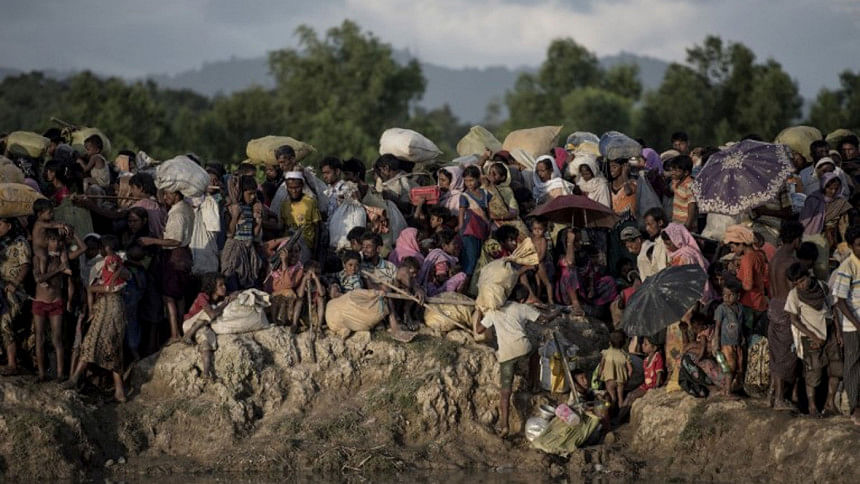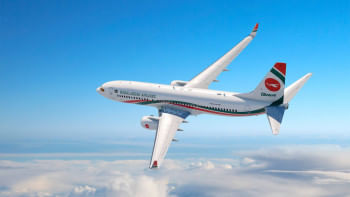The world’s most blighted minority

As the plight of Myanmar's Rohingya Muslim minority numbering nearly 1.2 million stranded in Bangladesh crosses the third painful year, one is reminded of the most blighted ethnic minority in Asia. Their miseries have long been known to the international community but real relief and rehabilitation is not in sight. The names of these hapless Rohingyas have been removed from Myanmar's draconian household registration system that keeps track of people's movements and they are often handed stiff fines.
The Rohingyas inhabit the worst position in Myanmar's dreadful human rights landscape. The men and young boys risk the dangerous journey across the Andaman Sea to seek employment and to send money back to families barely surviving in their homeland. The difference between a refugee fleeing persecution and one seeking a better life does not mean much to the Rohingya because both are true. They have borne the brunt of the Myanmar military regime's brutal State building for decades.
Myanmar's treatment of its Muslim minority has generally been characterised by neglect punctuated by scapegoating. The Rohingyas have been subjected to particularly harsh treatment, possibly more than any other ethno-religious minority in Myanmar. Despite not having staged any armed rebellion of substance against the central government in the past, successive military governments have harboured a uniquely vicious aversion to the Rohingya.
For the Rohingya, centuries of co-existence with the Arakanese Buddhists was bifurcated by British colonialism, when the boundaries of India and Burma were demarcated. As a result, the Rohingya became a people caught between States, with the majority situated in newly independent Burma in 1948. It would be relevant to recall that in 1978, the Burmese army mounted a murderous ethnic cleansing campaign they called Operation Dragon King (Naga Min) that drove 200,000 Rohingya into Bangladesh. Again in 1991, the Burmese army repeated the pogrom. More than a quarter million Rohingya were driven out of Arakan into Teknaf and Cox's Bazar in Bangladesh.
In Myanmar the Rohingyas are officially an alien and illegal community, not listed as one of the 135 recognised "ethnic nationalities" in Burma and thus the majority of them are not entitled to national identity cards. This Stateless status has provided the security forces with impunity to perpetrate routine abuses against Muslims in Western Burma.
The Myanmar military's routine abuses of the Rohingyas aggravate the chronic poverty. They are denied travel permission between villages, which limits employment opportunities, education and trade. Permission for even limited travel from local military units is most often denied. The military seize their land for military-connected business projects. Forced labour and expropriation of property is a daily reality. Religious persecution is widespread, with many mosques destroyed or ordered to by emptied. Extrajudicial killings are common. In fact, there is an unofficial policy of discrimination whose ultimate aim is the forced removal of a minority group.
The hatred towards the Rohingyas, beneath the excuses of national security, legal measures against illegal immigration, or even nationalism can be traced to racism. South Asians are derogatorily referred to as Kala (foreigner) in Burma by every other ethnic group, but the Rohingyas are even beneath this level of disdain. Muslims in Myanmar are more likely to be terrorised by the Myanmar military than to be terrorists.
The Rohingyas are more a foresworn people. No one wants them, even though the world is well aware of their predicament. Their persecution has been a litany of horrors that the international community has been well aware of, but helpless or unwilling to rectify. There is a collective failure to address the root causes of the flight of the Rohingyas from the Myanmar resulting in their continued misery.
The cause of an oppressed Muslim minority is given short shrift. Western governments claim to champion oppressed Christians but by downplaying much larger-scale violations against Muslims, they are jeopardising the remainder of the west's human rights credibility. Their passivity reinforces the global shift to the so-called religious nationalism that allegedly commenced in the Muslim world.
Since Muslims are resented more than other minorities, their plight tests whether liberal democracy means what it claims to mean. Sadly enough, the silence of Muslim countries, particularly of the Arab world, about the plight of large chunk of Muslims in Asia underlines the loneliness of Muslim minorities.
It is significant to note that at present the largest countries of the world by population are to varying degrees hostile to Muslims. The big powers of Asia are uninterested in the fate of Myanmar's Rohingyas who have been the world's biggest victims of ethnic cleansing in recent years. Broadly speaking, we are in a world that is largely callous about the fate of Muslims where they are the minority. No wonder that the miseries of the Rohingyas persist unabated.
Muhammad Nurul Huda is a former IGP.

 For all latest news, follow The Daily Star's Google News channel.
For all latest news, follow The Daily Star's Google News channel. 



Comments